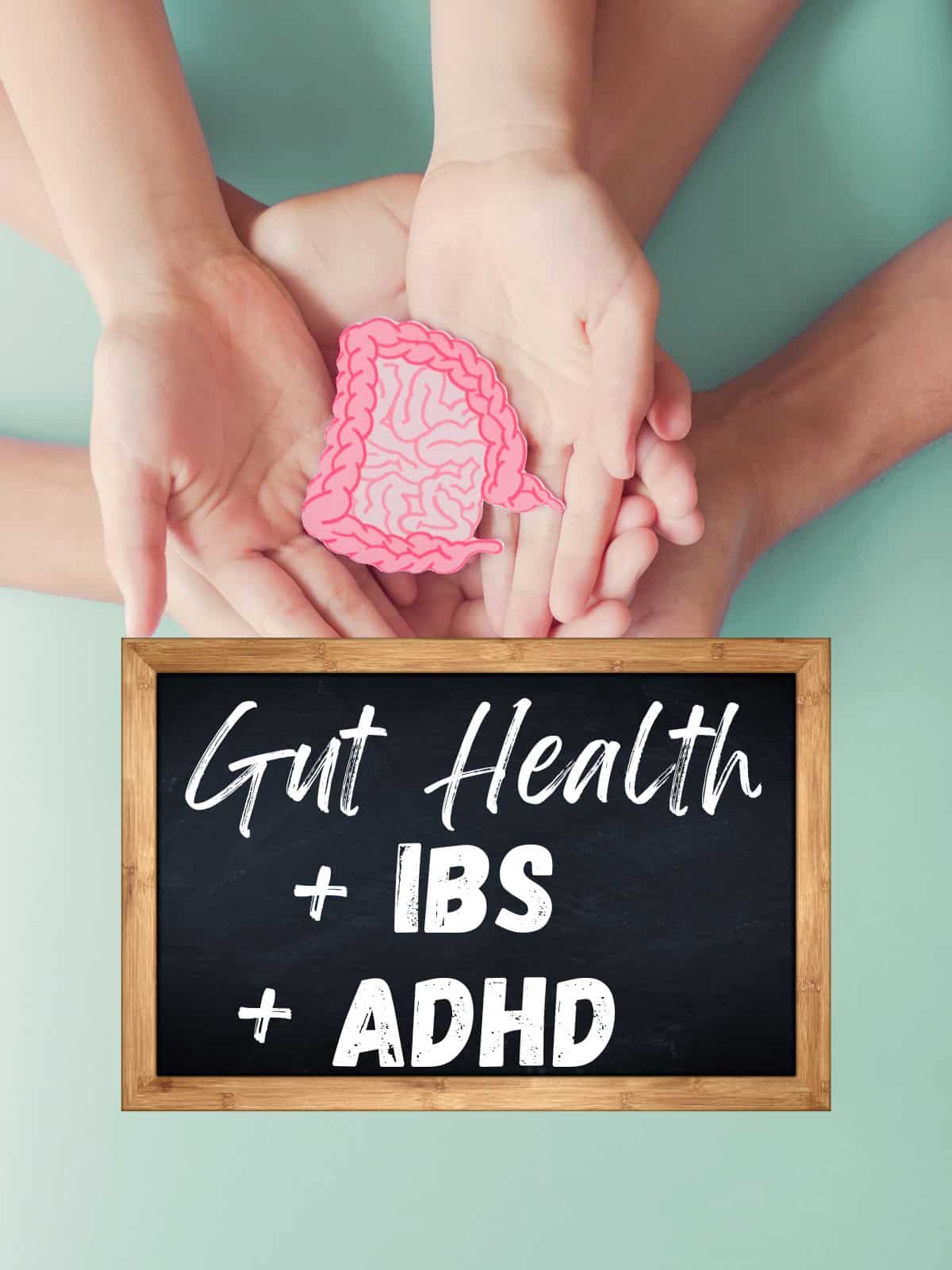The content on this website is for informational purposes only and is not meant to replace professional or medical advice. See our full disclaimer.
You may be wondering how ADHD and IBS could possibly be related. Especially when ADHD affects your brain and IBS affects your gut.
We know that Attention Deficit Hyperactivity Disorder (ADHD) is a mental health condition characterized by inattention, impulsivity, and hyperactivity. Whereas Irritable Bowel Syndrome (IBS) is a common gastrointestinal disorder known for causing abdominal pain, bloating, and changes in bowel habits.
Well, research suggests these two seemingly unrelated conditions might be more connected than we previously thought. So, let's jump right in!
Jump to:
Is ADHD related to gut health?
It's interesting how our bodies work. Did you know that your gut and your brain are in constant communication? Yep, it's true! This connection, known as the gut-brain axis, plays a crucial role in both our physical and mental health.
Some research even suggests that gut health might exacerbate ADHD symptoms.
On the other hand, ADHD can influence your digestive system. Research suggests that adults and children with ADHD are more likely to experience gastrointestinal issues like IBS and chronic constipation.
The reasons for this are not entirely clear, but it's possible that the stress and anxiety often associated with ADHD may contribute to these digestive problems.
Not to mention some ADHD medications can cause gastrointestinal side effects, which might exacerbate digestive issues like IBS.
The research on ADHD and IBS
When it comes to understanding the association between ADHD and IBS, several studies provide intriguing insights. For instance, a study in Scientific Reports found that adult ADHD patients had a significantly higher prevalence of IBS compared to the general population.1The association between ADHD and physical health: a co-twin control study
Additionally, a study published in the National Center for Biotechnology Information found that young adults with ADHD were more likely to experience gastrointestinal symptoms, including constipation and diarrhea, compared to people without ADHD.2Attention deficit hyperactivity disorder and gastrointestinal morbidity
Research from another study shows that if a parent is diagnosed with Irritable Bowel Syndrome, their children are more likely to experience ADHD compared to other kids whose parents don't have IBS.3Risks of Major Mental Disorders and Irritable Bowel Syndrome among the Offspring of Parents with Irritable Bowel Syndrome: A Nationwide Study
This doesn't mean that one condition causes the other, but it does suggest that they might be related in some way.
Interestingly, ADHD isn't the only neuropsychiatric disorder associated with IBS. Studies have found that other conditions, including anxiety and depression, are also more prevalent in people with IBS.4Anxiety and depression in irritable bowel syndrome
This points to a potentially broader connection between mental health and gut health.
So can ADHD cause IBS?
It's a tricky question. While the research suggests an association between ADHD and IBS, it's important to note that correlation doesn't imply causation. This means that while ADHD and IBS often occur together, we can't say with certainty that ADHD is the cause of IBS (or vice versa).
IBS, or irritable bowel syndrome, is a bit of a puzzle. It's influenced by a whole mix of factors - genetics, environment, and even your lifestyle.
Now, how does ADHD come into the picture? One of these is the gut-brain axis that I mentioned before- it's like a two-way communication line between your gut and your brain.
Changes in this communication might play a role in both IBS and ADHD. For example, if the good bacteria in your gut are out of balance, it could potentially influence your brain function, contributing to ADHD symptoms.
There could also be shared genetic factors. Just like with IBS, researchers believe that certain genes might make a person more susceptible to ADHD. So, it's possible that the same genes contributing to ADHD could also be playing a part in IBS.
Remember, this is a complex area and scientists are still figuring things out. But hopefully, this gives you a clearer picture of how these conditions might be linked!
How to improve your ADHD with gut health
While we're still unraveling the complex relationship between ADHD and gut health, here are some strategies that might help manage both conditions:
- Prioritize a balanced diet: Nutrient-dense, whole foods can nourish your gut and support your overall health. Try to include a variety of fruits, vegetables, lean proteins, whole grains, and healthy fats in your diet. These foods are already recommended for people with ADHD, regardless of gut health.
- Hydrate: Drink enough water throughout the day. It's essential for digestion and overall health.
- Exercise regularly: Physical activity can support both mental health and digestive function and is known to improve ADHD symptoms.
- Mind your stress levels: We all know stress can exacerbate both ADHD symptoms and IBS. Techniques such as mindfulness, yoga, and deep-breathing exercises are a good place to start to help manage stress levels.
- Consider taking probiotics to help improve your adhd and IBS: These beneficial bacteria can support gut health, which might influence ADHD symptoms. (Always consult with a healthcare professional before starting any new supplement regimen.)
- Seek professional help: If you're struggling with ADHD, IBS, or both, don't hesitate to reach out to your doctor. They can provide guidance and support tailored to your unique needs.
Improving gut health may be one aspect of managing your ADHD. But remember, every person is unique, and what works for one person might not work for another.
It's a lot to handle, but you're not alone in this journey! There's a community of adults and children alike who are dealing with similar experiences (myself included!). Be patient with yourself, and remember that the progress to feeling better takes time.
References:
- 1
- 2
- 3
- 4





Linda says
The connection is serotonin levels. I have a spastic colon with low levels of serotonin. My brother had ADHD. There are a few articles and research papers online regarding deficient levels of serotonin. I’m finding this connection fascinating and hope they continue to study.
Honestly ADHD team says
Very interesting, thank you for sharing!